- Home
- Martin Amis
Einstein's Monsters Page 3
Einstein's Monsters Read online
Page 3
Soon after I realized I was writing about nuclear weapons (and the realization took quite a while: roughly half of what follows in this book was written in innocence of its common theme), I further realized that in a sense I had been writing about them all along. Our time is different. All times are different, but our time is different. A new fall, an infinite fall, underlies the usual-indeed traditional-presentiments of decline. To take only one example, this would help explain why something seems to have gone wrong with time -with modern dme; the past and the future, equally threatened, equally cheapened, now huddle in the present. The present feels narrower, the present feels straitened, discrepant, as the planet lives from day to day. It has been said -Bellow again-that the modern situation is one of suspense: no one, no one at all, has any idea how things will turn out. What we are experiencing, in as much as it can be experienced, is the experience of nuclear war. Because the anticipation-Schell again-the anxiety, the suspense, is the only experience of nuclear war that anyone is going to get. The reality (different kinds of death, in a world without discourse) could hardly be called human experience, any more than such temporary sentience as remained could be called human life. It would just be human death. So this is it, this is nuclear war-and it is ruining everything. The "effects" of nuclear weapons have been exhaustively studied, though of course nobody will ever know their full extent. What are the psychological effects of nuclear weapons? As yet undetonated, the world's arsenals are already waging psychological warfare; deterrence itself, for instance, is entirely psychological (and, for that reason, entirely inexact). The airbursts, the preemptive strikes, the massive retaliations, the uncontrollable escalations: it is already happening inside our heads. If you think about nuclear weapons, you feel sick. If you don't think about them, you feel sick without knowing why. Nuclear weapons repel all thought, perhaps because they can end all thought.
For some reason, and it is no doubt an intriguing reason, the bulk of imaginative fiction on the subject belongs to the genres. Pentagon-and-Kremlin countdowns, terrorist or rogue-leader nail-biters, love and pain in the postapocalyptic tundra. Science fiction started concerning itself with doomsday weapons long before such weapons were ever mooted, and nowadays about one SF novel in four is set beyond the holocaust. Meanwhile, it is astonishing how little the mainstream has had to say about the nuclear destiny-a destiny that does not want for complication, inclusiveness, pattern, paradox, that does not want for interest. (Nuclear weapons have many demerits, but drabness is not one of them.) And yet the senior generation of writers has remained silent; prolific and major though many of them are, with writing lives that straddled the evolutionary firebreak of 1945, they evidently did not find that the subject suggested itself naturally. They lived in one kind of world, then they lived in another kind of world; and they didn't tell us what the difference was like. I recently asked Graham Greene what the difference was like, and he said that he had never really thought about it. I do not count this as any kind of defeat for Graham Greene, the most prescient writer of our time. But I do count it as some kind of victory for nuclear weapons.
Clearly a literary theme cannot be selected, cannot be willed; it must come along at its own pace. Younger writers, writers who have lived their lives on the other side of the firebreak, are beginning to write about nuclear weapons. My impression is that the subject resists frontal assault. For myself, I feel it as a background, a background which then insidiously foregrounds itself. Maybe the next generation will go further; maybe the next generation will be more at home with the end of the world… Besides, it could be argued that all writing-all art, in all times-has a bearing on nuclear weapons, in two important respects. Art celebrates life and not the other thing, not the opposite of life. And art raises the stakes, increasing the store of what might be lost.
Mutual Assured Destruction: it sounds like an insurance firm or a building society until we reach its final element. Will we reach its final element? MAD is a disgusting and ridiculous doctrine, and a desire to escape from it has now given us SDL I had been reading the pro-SDI literature for quite some time when, sure enough, I finally came across something to be said for it. It might lessen the slaughter of an accidental war. The next day I read Daniel Ford's brilliant book, The Button, and learned that accidental war is something that many of the fiercest critics of nuclear policy now utterly discount. So SDI has nothing to be said for it. Arms improvement is the very crux of the present danger. A new emphasis on defense combined with arms reduction and obsolescence is a possible future. A new emphasis on defense combined with the status quo is just more of the same. It is just more weapons. Weapons are like money: no one knows the meaning of enough. If we could look at ourselves from anything approaching the vantage of cosmic time, if we had any sense of cosmic power, cosmic delicacy, then every indicator would point the same way: down. Down, down, down. We do not need this new direction, which is up.
In The Logic of Deterrence, Anthony Kenny, a philosopher and former priest, is unfailingly apposite in his search for moral breathing space in the nuclear world. In terms of ethics, justice, and humanity, deterrence is a ruin; it is unsurprising that it has no logic either. A first strike is morally impossible. But so is a second strike. Deterrence having failed, it cannot be effected retroactively by retaliation. Schell makes the point very neatly:
… there is nothing that it would make sense to do "if deterrence fails"… When the President is asked what the United States will do if it is subjected to nuclear attack by the Soviet Union, he cannot answer, "I will immediately call up the Soviet Premier and ask him to please stop." He cannot tell the world that if we suffer nuclear attack our retaliation will be a phone call. For the instant he gave that answer deterrence would dissolve.
Generally it is encouraging to see the weight of the churches being enlisted toward the Utopian unanimity, in the form of papal statements, pastoral letters, responsible activism, and so on. But nuclear weapons are mirrors in which we see all the versions of the human shape. Incomparably the most influential religious body on earth, the New Evangelicals, who exercise real power, warmly anticipate "a holy nuclear war," which will exalt Israel (where the hostilities begin) and crush Russia, before going on to dramatize the Apocalypse. These people are Born Again; and they seem to want to Die Again. A "holy" nuclear war: here we stare into the foundry of the moronic inferno, an inferno that is one of our possible futures.
* * *
I write these words in Israel. Our group has just visited the Museum of the Holocaust. Our group has just climbed Masada. "Masada": whereas the historicity of the Masada story remains uncertain, its mythopoeic importance to the Jewish idea is clear enough. (Hence "the Masada complex," in fact a hawkish formulation used to shore up Israeli maxi-malism.) Suppression, revolt, beleaguerment, mass suicide -sacrifice. A holocaust is a sacrifice, "a sacrifice wholly consumed by fire… a whole burnt offering… a complete sacrifice."
The northern view from the monstrous boulder of Masada is one of elemental beauty. It makes you feel what it is to live on a planet; it makes you feel what it is to live on a larger, emptier, cleaner, and more innocent planet than earth. Everything-the firm mountains to the left, the spurs and undulations of the plain, the Dead Sea, the misty heights of Jordan-is hugely dominated by the sky; even the burnished acres of the water can reflect only a fraction of the circumambient blue. In fact the biosphere is shallow: space, outer space, is only an hour's drive away (space is nearer than Jerusalem); but the Judean sky looks like infinity. Below, the terrain is a terrain for war, conventional war: conventional death, conventional wreckage, under these same heavens. But another kind of war, a nuclear one (I thought, with double vertigo), could wreck the sky. Later that day a journalist from the Jerusalem Post told me about "the Warehouse," a building in the desert surrounded by barbed wire and armed guards, the supposed locus of Israel's nuclear effort. It is not altogether clear-it never is- whether Israel has the bomb or merely the ability to make one. I want to know wh
at use this weapon would be. What use are they, ever? Beirut and Damascus are both forty miles from Israel's border, an hour's drive away, like space. For Israel, a nuclear weapon would be a Masada weapon. That's what nuclear weapons are: Masada weapons.
Meanwhile they squat on our spiritual lives. There may be a nuclear "priesthood," but we are the supplicants, and we have no faith. The warheads are our godheads. Nuclear weapons could bring about the Book of Revelation in a matter of hours; they could do it today. Of course, no dead will rise; nothing will be revealed (nothing meaning two things, the absence of everything and a thing called nothing). Events that we call "acts of God"-floods, earthquakes, eruptions-are flesh wounds compared to the human act of nuclear war: a million Hiroshimas. Like God, nuclear weapons are free creations of the human mind. Unlike God, nuclear weapons are real. And they are here.
Revulsion at MAD is understandable and necessary. I suggest, however, that MAD is not just a political creation but a creation of the weapons themselves. Always we keep coming back to the weapons as if they were actors rather than pieces of equipment; and they earn this status, by virtue of their cosmic power. They are actors and, considered on the human scale, insane actors. The weapons are insane, they are MAD: they can assume no other form. In one of those philosopher's throat clearings, Anthony Kenny says that "weapons considered merely as inert pieces of hardware are not, of course, objects of moral evaluation. It is the uses to which they are put…" This isn't so. Recent evidence strongly suggests that nuclear weapons, in their inert state, are responsible for a variety of cancers and leukemias. What toxicity, what power, what range. They cause death even before they go off.
The A-bomb is a Z-bomb, and the arms race is a race between nuclear weapons and ourselves. It is them or us. What do nukes do? What are they for? Since when did we all want to kill each other? Nuclear weapons deter a nuclear holocaust by threatening a nuclear holocaust, and if things go wrong then that is what you get: a nuclear holocaust. If things don't go wrong, and continue not going wrong for the next millennium of millennia (the boasted forty years being no more than forty winks in cosmic time), you get… What do you get? What are we getting?
At the multiracial children's tea party the guests have, perhaps, behaved slightly better since the Keepers were introduced. Little Ivan has stopped pulling Fetnab's hair, though he is still kicking her leg under the table. Bobby has returned the slice of cake that rightfully belonged to tiny Conchita, though he has his eye on that sandwich and will probably make a lunge for it sooner or later. Out on the lawn the Keepers maintain a kind of order, but standards of behavior are pretty well as troglodytic as they ever were. At best the children seem strangely subdued or off-color. Although they are aware of the Keepers, they don't want to look at them, they don't want to catch their eye. They don't want to think about them. For the Keepers are a thousand feet tall, and covered in gelignite and razor blades, toting flamethrowers and machine guns, cleavers and skewers, and fizzing with rabies, anthrax, plague. Curiously enough, they are not looking at the children at all. With bleeding hellhound eyes, mouthing foul threats and shaking their fists, they are looking at each other. They want to take on someone their own size…
If they only knew it-no, if they only believed it-the children could simply ask the Keepers to leave. But it doesn't seem possible, does it? It seems-it seems unthinkable. A silence starts to fall across the lawn. The party has not been going for very long and must last until the end of time. Already the children are weepy and feverish. They all feel sick and want to go home.
FIVE STORIES
BUJAK AND THE STRONG FORCE or GOD'S DICE
Bujak? Yeah, I knew him. The whole street knew Bujak. I knew him before and I knew him after. We all knew Bujak -sixty years old, hugely slabbed and seized with muscle and tendon, smiling at a bonfire in the yard, carrying desks and sofas on his back, lifting a tea-chest full of books with one hand. Bujak, the strongman. He was also a dreamer, a reader, a babbler… You slept a lot sounder knowing that Bujak was on your street. This was 1980. I was living in London, West London, carnival country, what the police there call the front line. dr. alimantado, sons of thunder, race WAR, NO future: dry thatched dreadlocks, the scarred girls in the steeped pubs. Those black guys, they talked like combative drunks, all the time. If I went up to Manchester to stay with my girlfriend, I always left a key with Bujak. Those hands of his, as hard as coal, the nails quite square and symmetrical, like his teeth. And the forearms, the Popeye forearms, hefty and tattoo-smudged and brutal, weapons of monstrous power. Large as he was, the energies seemed impacted in him, as though he were the essence of an even bigger man; he stood for solidity. I am as tall as Bujak, but half his weight. No, less. Bujak once told me that to create a man out of nothing would require the equivalent energy of a thousand-megaton explosion. Looking at Bujak, you could believe this. As for me, well, a single stick of TNT might do the job-a hand grenade, a firecracker. In his physical dealings with me (you know, the way someone moves across a room toward you, this can be a physical event) he showed the tender condescension that the big man shows to the small. Probably he was like that with everyone. He was protective. And then, to good Bujak, thoughtful, grinning Bujak, the worst thing happened. A personal holocaust. In the days that followed I saw and felt all of Bujak's violence.
His life went deep into the century. Warrior caste, he fought in Warsaw in 1939. He lost his father and two brothers at Katyn. He was in the resistance-all his life he was in the resistance. In that capacity he visited (and this is a story of violence, of visitation) many neat tortures on Nazi collaborators. He rose up with the Armia Kraiova and was imprisoned in December 1944. During the postwar years he worked in a touring circus, a strongman, bending bars, butting brick walls, tugging trucks with his teeth. In 1956, the year of my birth, he was there for the Polish October, and for the November in "Hungaria." Then the United States, the halls, queues, and cubicles of Ellis Island, with wife, mother, small daughter. His wife Monika was hospitalized in New York for a minor condition; she came down with a hospital supergerm and died overnight. Bujak worked as a longshoreman in Fort Lauderdale. He took and gave many crunchy beatings-strikebreakers, mob men, union goons. But he prospered, as you're meant to do, in America. What brought him to England, I think, was a certain kind of (displaced) Polish nostalgia or snobbery, and a desire for peace. Bujak had lived the twentieth century. And then, one day, the twentieth century, a century like no other, came calling on him. Bookish Bujak himself, I'm sure, saw the calamity as in some sense post-nuclear, Einsteinian. It was certainly the end of his existing universe. Yes, it was Bujak's Big Crunch.
I first met Bujak one wintry morning in the late spring of 1980-or of PN 35, if you use the postnuclear calendar that he sometimes favored. Michiko's car had something wrong with it, as usual (a flat, on this occasion), and I was down on the street grappling with the burglar tools and the spare. Compact and silent, Michiko watched me sadly. I'd managed to loosen the nuts on the collapsed wheel, but the aperture for the jack was ominously soft and sticky with rust. The long-suffering little car received the vertical spear in its chassis and stayed stoically earthbound. Now I have to say that I am already on very bad terms with the inanimate world. Even when making a cup of coffee or changing a light bulb (or a fuse!), I think-What is it with objects? Why are they so aggressive? What's their beef with me?
Objects and I, we can't go on like this. We must work out a compromise, a freeze, before one of us does something rash. I've got to meet with their people and hammer out a deal.
"Stop it, Sam," said Michiko.
"Get a real car," I told her.
"Please, just stop. Stop it! I'll call a towtruck or something."
"Get a real car," I said and thought-yeah, or a real boyfriend. Anyway, I was throwing the tools into their pouch, dusting my palms and wiping away my tears when I saw Bujak pacing across the road toward us. Warily I monitored his approach. I had seen this hulking Bohunk or throwback Polack from my study wi
ndow, busying himself down on the street, always ready to flex his primitive can-do and know-how. I wasn't pleased to see him. I have enough of the standard-issue paranoia, or I did then. Now I've grown up a little and realize that I have absolutely nothing to fear, except the end of the world. Along with everybody else. At least in the next war there won't be any special wimps, punchbags, or unpopularity contests. Genocide has had its day and we're on to something bigger now. Suicide.
"You a Jew?" asked Bujak in his deeply speckled voice.
"Yup," I said.
"Name?"
And number? "Sam," I told him.
"Short for?"
I hesitated and felt Michi's eyes on my back.
"Is it Samuel?"
"No," I said. "Actually it's Samson."
The smile he gave told me many things, most obviously that here-here was a happy man. All eyes and teeth, the smile was ridiculous in its gaiety, its candor. But then happiness is a pretty clownish condition, when you stop to think about it. I mean, round-the-clock happiness, it's hardly an appropriate response. To me, this gave him an element of instability, of counterstrength, of violence. But Bujak here was clearly happy, in his universe. Bujak, with his happiness accessory.
"Jews usually good up here," he said, and knocked a fingertip on his shaved head. "No good with their hands."

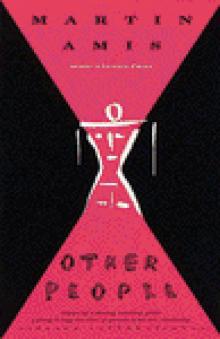 Other People
Other People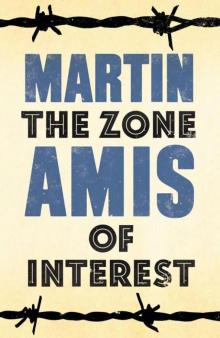 The Zone of Interest
The Zone of Interest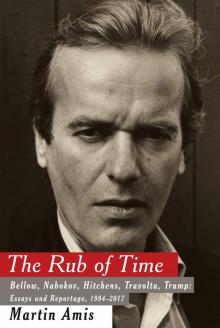 The Rub of Time: Bellow, Nabokov, Hitchens, Travolta, Trump
The Rub of Time: Bellow, Nabokov, Hitchens, Travolta, Trump Koba the Dread
Koba the Dread Success
Success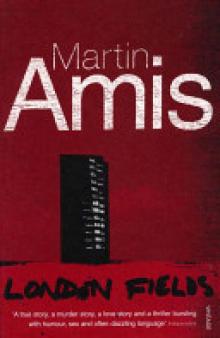 London Fields
London Fields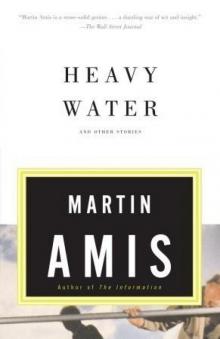 Heavy Water: And Other Stories
Heavy Water: And Other Stories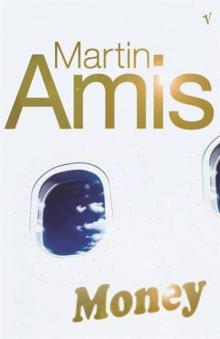 Money
Money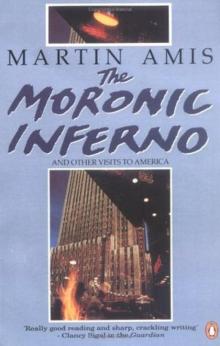 The Moronic Inferno and Other Visits to America
The Moronic Inferno and Other Visits to America Yellow Dog
Yellow Dog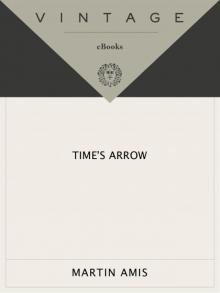 Time's Arrow
Time's Arrow Experience: A Memoir
Experience: A Memoir Einstein's Monsters
Einstein's Monsters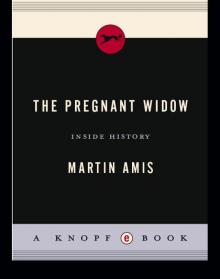 The Pregnant Widow
The Pregnant Widow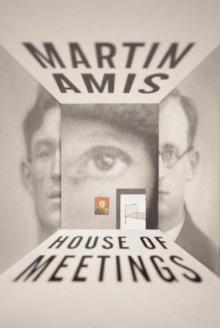 House of Meetings
House of Meetings The Information
The Information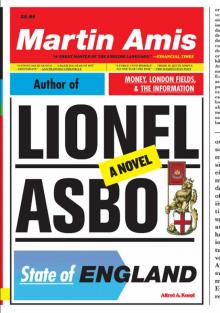 Lionel Asbo: State of England
Lionel Asbo: State of England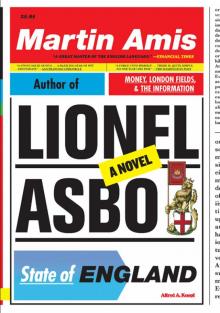 Lionel Asbo
Lionel Asbo Heavy Water and Other Stories
Heavy Water and Other Stories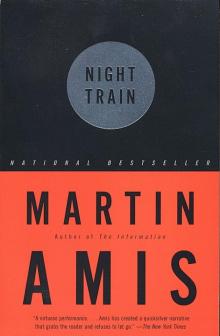 Night Train
Night Train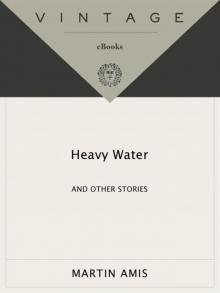 Heavy Water
Heavy Water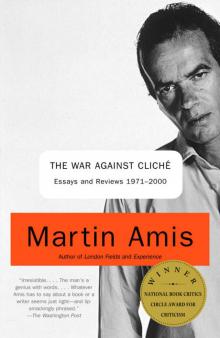 The War Against Cliche: Essays and Reviews 1971-2000 (Vintage International)
The War Against Cliche: Essays and Reviews 1971-2000 (Vintage International)